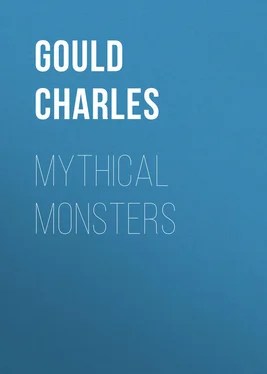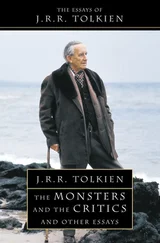Charles Gould - Mythical Monsters
Здесь есть возможность читать онлайн «Charles Gould - Mythical Monsters» — ознакомительный отрывок электронной книги совершенно бесплатно, а после прочтения отрывка купить полную версию. В некоторых случаях можно слушать аудио, скачать через торрент в формате fb2 и присутствует краткое содержание. Жанр: Мифы. Легенды. Эпос, Природа и животные, foreign_antique, foreign_prose, на английском языке. Описание произведения, (предисловие) а так же отзывы посетителей доступны на портале библиотеки ЛибКат.
- Название:Mythical Monsters
- Автор:
- Жанр:
- Год:неизвестен
- ISBN:нет данных
- Рейтинг книги:5 / 5. Голосов: 1
-
Избранное:Добавить в избранное
- Отзывы:
-
Ваша оценка:
- 100
- 1
- 2
- 3
- 4
- 5
Mythical Monsters: краткое содержание, описание и аннотация
Предлагаем к чтению аннотацию, описание, краткое содержание или предисловие (зависит от того, что написал сам автор книги «Mythical Monsters»). Если вы не нашли необходимую информацию о книге — напишите в комментариях, мы постараемся отыскать её.
Mythical Monsters — читать онлайн ознакомительный отрывок
Ниже представлен текст книги, разбитый по страницам. Система сохранения места последней прочитанной страницы, позволяет с удобством читать онлайн бесплатно книгу «Mythical Monsters», без необходимости каждый раз заново искать на чём Вы остановились. Поставьте закладку, и сможете в любой момент перейти на страницу, на которой закончили чтение.
Интервал:
Закладка:
When decay and neglect are once initiated, the hand of man largely assists the ravages of time. The peasant carts the marbles of an emperor’s palace to his lime-kiln, 90or an Egyptian monarch strips the casing of a pyramid 91to furnish the material for a royal residence.
Nor is it beyond the limits of possibility that the arrogant caprice of some, perhaps Mongol, invader in the future, may level the imperishable pyramids themselves for the purpose of constructing some defensive work, or the gratification of an inordinate vanity.
In later dates how many comfortable modern residences have been erected from the pillage of mediæval abbey, keep, or castle? and how many fair cities 92must have fallen to decay, in Central and Eastern Asia, and how many numerous populations dwindled to insignificance since the days when Ghenghis and Timour led forth their conquering hordes, and Nadun could raise four hundred thousand horsemen 93to contest the victory with Kublai Khan.
The unconscious ploughman in Britain has for centuries guided his share above the remains of Roman villas, and the inhabitants of the later city of Hissarlik were probably as ignorant that a series of lost and buried cities lay below them, as they would have been incredulous that within a thousand years their own existence would have passed from the memory of man, and their re-discovery been due only to the tentative researches of an enthusiastic admirer of Homer. Men live by books and bards longer than by the works of their hands, and impalpable tradition often survives the material vehicle which was destined to perpetuate it. The name of Priam was still a household word when the site of his palace had been long forgotten.
The vaster a city is, the more likely is it to be constructed upon the site of its own grave, or, in other words, to occupy the broad valley of some important river beneath whose gravels it is destined to be buried.
Perched on an eminence, and based on solid rock, it may escape entombment, but more swiftly and more certainly will it be destroyed by the elements, 94and by the decomposition of its own material furnish the shroud for its envelopment. 95It is not altogether surprising then that no older discoveries than those already quoted have yet been made, for these would probably never have resulted if tradition had not both stimulated and guided the fortunate explorer.
It is, therefore, no unfair inference that the remains of equally important, but very much more ancient cities and memorials of civilization may have hitherto entirely escaped our observation, presuming that we can show some reasonable grounds for belief that, subsequent to their completion, a catastrophe has occurred of sufficiently universal a character to have obliterated entirely the annals of the past, and to have left in the possession of its few survivors but meagre and fragmentary recollections of all that had preceded them.
Now this is precisely what the history and traditions of all nations affirm to have occurred. However, as a variance of opinion exists as to the credence which should be attached to these traditions, I shall, before expressing my own views upon the subject, briefly epitomize those entertained by two authors of sufficient eminence to warrant their being selected as representatives of two widely opposite schools.
These gentlemen, to whom we are indebted for exhaustive papers, 96embracing the pith of all the information extant upon the subject, have tapped the same sources of information, consulted the same authorities, ranged their information in almost identical order, argued from the same data, and arrived at diametrically opposite conclusions.
Mr. Cheyne, following the lead of Continental mythologists, deduces that the Deluge stories were on the whole propagated from several independent centres, and adopts the theory of Schirrer and Gerland that they are ether myths, without any historical foundation, which have been transferred from the sky to the earth.
M. Lenormant, upon the other hand, eliminating from the inquiry the great inundation of China in the reign of Yao, and some others, as purely local events, concludes as the result of his researches that the story of the Deluge “is a universal tradition among all branches of the human race,” with the one exception of the black. He further argues: “Now a recollection thus precise and concordant cannot be a myth voluntarily invented. No religious or cosmogenic myth presents this character of universality. It must arise from the reminiscences of a real and terrible event, so powerfully impressing the imagination of the first ancestors of our race, as never to have been forgotten by their descendants. This cataclysm must have occurred near the first cradle of mankind and before the dispersion of families from which the different races of men were to spring.”
Lord Arundel of Wardour adopts a similar view in many respects to that of M. Lenormant, but argues for the existence of a Deluge tradition in Egypt, and the identity of the Deluge of Yu (in China) with the general catastrophe of which the tradition is current in other countries.
The subject is in itself so inviting, and has so direct a bearing upon the argument of this work that I propose to re-examine the same materials and endeavour to show from them that the possible solutions of the question have not yet been exhausted.
We have as data: —
1. The Biblical account.
2. That of Josephus.
3. The Babylonian.
4. The Hindu.
5. The Chinese.
6. The traditions of all nations in the northern hemisphere, and of certain in the southern.
It is unnecessary to travel in detail over the well-worn ground of the myths and traditions prevalent among European nations, the presumed identity of Noah with Saturn, Janus, and the like, or the Grecian stories of Ogyges and Deucalion. Nor is anyone, I think, disposed to dispute the identity of the cause originating the Deluge legends in Persia and in India. How far these may have descended from independent sources it is now difficult to determine, though it is more than probable that their vitality is due to the written Semitic records. Nor is it necessary to discuss any unimportant differences which may exist between the text of Josephus and that of the Bible, which agree sufficiently closely, but are mere abstracts (with the omission of many important details) in comparison with the Chaldæan account. This may be accounted for by their having been only derived from oral tradition through the hands of Abraham. The Biblical narrative shows us that Abraham left Chaldæa on a nomadic enterprise, just as a squatter leaves the settled districts of Australia or America at the present day, and strikes out with a small following and scanty herd to search for, discover, and occupy new country; his destiny leading him, may be for a few hundred, may be for a thousand miles. In such a train there is no room for heavy baggage, and the stone tablets containing the detailed history of the Deluge would equally with all the rest of such heavy literature be left behind.
The tradition, however reverenced and faithfully preserved at first, would, under such circumstances, soon get mutilated and dwarfed. We may, therefore, pass at once to the much more detailed accounts presented in the text of Berosus, and in the more ancient Chaldæan tablets deciphered by the late Mr. G. Smith from the collation of three separate copies.
The account by Berosus (see Appendix) was taken from the sacred books of Babylon, and is, therefore, of less value than the last-mentioned as being second-hand. The leading incidents in his narrative are similar to those contained in that of Genesis, but it terminates with the vanishing of Xisuthros (Noah) with his wife, daughter, and the pilot, after they had descended from the vessel and sacrificed to the gods, and with the return of his followers to Babylon. They restored it, and disinterred the writings left (by the pious obedience of Xisuthros) in Shurippak, the city of the Sun.
Читать дальшеИнтервал:
Закладка:
Похожие книги на «Mythical Monsters»
Представляем Вашему вниманию похожие книги на «Mythical Monsters» списком для выбора. Мы отобрали схожую по названию и смыслу литературу в надежде предоставить читателям больше вариантов отыскать новые, интересные, ещё непрочитанные произведения.
Обсуждение, отзывы о книге «Mythical Monsters» и просто собственные мнения читателей. Оставьте ваши комментарии, напишите, что Вы думаете о произведении, его смысле или главных героях. Укажите что конкретно понравилось, а что нет, и почему Вы так считаете.











